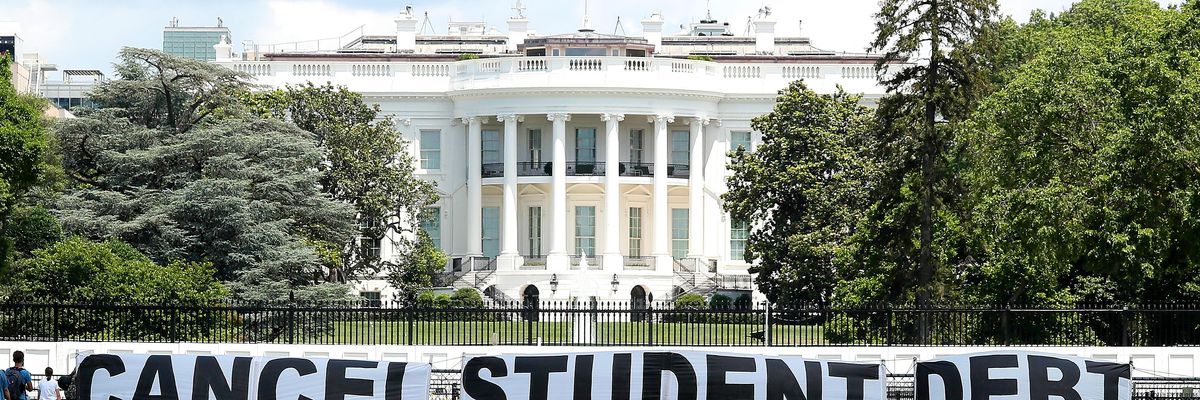Economist Marshall Steinbaum recently appeared on my radio show The Zero Hour to discuss the economic and ethical issues surrounding student debt cancellation. Steinbaum, a Senior Fellow in Higher Education Finance at the Jain Family Institute and a professor at the University of Utah, is one of the authors of a seminal 2018 study from the Levy Economics Institute on the macroeconomic impact of student debt. As pressure grows for a solution, Steinbaum discussed with me both the economics and the ethics of student debt. The following selections from the interview have been lightly edited for clarity.
"We've now had a repayment pause for nearly two years," Steinbaum said, and "the President just extended it by another couple of months." (Note: Repayments have been suspended until May 1, 2022.) "And my view is that this, along with other ... emergency pandemic income support policies for households is a good reason why the period of the pandemic has not been significantly worse, economically speaking, for the United States."
Adds Steinbaum, "In that sense, I view the repayment pause as vindicating the predictions in the macroeconomic paper."
Watch the interview:
In the following exchange, Steinbaum discussed the ethical and economic dimensions of student debt:
ESKOW: We can also put a pin in ... the moral argument, which exists entirely independently of the economics ... (and ask) if, in fact, it was socially unjust to impose this debt on people in order to obtain what we might argue is a public good. (It) should arguably be addressed in some other way as we correct the injustice, perhaps by going to people with more disposable income than student debt holders. Would you agree with that?
STEINBAUM: Yeah, I definitely agree with that. I would add one further point to it ... there's definitely a moral case for student debt cancellation and a moral--an immoral case--that student debt is an unjust way to finance a higher education system... My view is that people have had to take on more student debt in order to get basically the same job that they would have previously been able to get with a smaller amount of student debt had they been born in a previous cohort--either because college was cheaper or because their jobs just didn't require higher education at all ....
ESKOW: ... You're talking about kind of a "credential inflation" ... and (you have written that) nearly all negative net worth households are in negative territory, thanks to student debt. That category is growing rapidly. Could you say something about that?
STEINBAUM: Sure. Student debt is by far and away the greatest reason why a household would ever be a negative territory ... student debt is not secured ... So, if you look at the student debt crisis, as we call it, which is just to say the mounting balances of student loans in the population... Prior to that, very few households were in negative territory.
ESKOW: So, if you believe that as a social condition households with negative net worth are a problem, then ... canceling student debt would help address that problem very significantly. Right?
STEINBAUM: Yeah. And ... I think 'credential inflation,' as you characterize it, is a fact. That is a pattern in the labor market, increasingly over time, an entirely empirical thing.
This idea that negative household net worth doesn't matter, because you should count human capital, that's more of a theoretical argument. ... especially because a lot of student debtors don't have a college degree or even any college experience at all ... (many economists) think if you go to college you earn more money than you otherwise would have earned, and that should be capitalized in your household net worth.
And that, I think, is like total economist brain.
ESKOW: And Marshall, I've been thinking about the issue of non-repayment (of student loans) ... if borrowers can't pay them back, then the only impact that not cancelling their debt has is to harm them ... it's almost Calvinistic. 'Well, you took on this debt, you should have known better. And even though there's no benefit to be gained from continuing to hold this debt over you, we want to make sure you experience extreme and prolonged pain because you dared to do it.' Am I unfair?
STEINBAUM: No, no, I think it's absolutely accurate to reinterpret what are supposedly economic arguments in light of what's actually going on, which is very much a moralistic judgment ...
ESKOW: I "stan" (American philosopher and education advocate) John Dewey. I think that education has social and cultural value that can't be put in dollars and cents terms. But, in effect, it seems to me that we're charging students usurious rates to get an education that will benefit everybody else at least as much as it benefits them, and probably more. In that sense, we are in debt to them, rather than the other way around. What do you think of that?
STEINBAUM: I definitely subscribe to the view that higher education, like all education, is a public good. And it was a mistake from the very beginning to conceive it as an investment in your future earnings. You know, this is the so-called human capital model in, in economics, that is an ideology of privatization of public goods...
But I view my role in all of this as yanking this entire debate away from the idea that people invest in education to invest in their future earnings.
The entire interview can be seen here or above.
